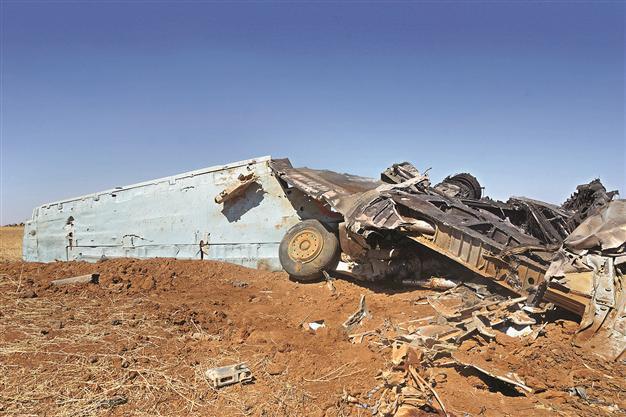Partial no-fly zone included in US-Turkey consensus: Turkish sources
Uğur Ergan - ANKARA

A general view shows a plane that belongs to forces loyal to Syria's President Bashar Al-Assad after it crashed in Daraa, Syria June 11, 2015. REUTERS photo
A recent joint action consensus between Turkey and the United States, which includes the use of the İncirlik Airbase in southern Turkey in fight against the Islamic State of Iraq and the Levant (ISIL) jihadists, also covers a partial no-fly zone over the Turkey-Syria border, according to Turkish sources.The 90-kilometer line between Syria’s Mare and Cerablus will be 40 to 50 kilometers deep, sources told daily Hürriyet, while elaborating on the consensus outlined by Deputy Prime Minister Bülent Arınç, following a cabinet meeting on July 22.
However, sources avoided saying whether such a zone would be broadened in the future.
This security line will prevent radical groups such as the Islamic State of Iraq and the Levant (ISIL) or the al-Qaeda-affiliated al-Nusra Front from gaining the mentioned land.
U.S.-led coalition jets will provide security over the land “when needed,” carrying out “attacking or exploration” flights, sources said.
Jets belonging to Turkey, which is not a member of the coalition but lends support to the anti-ISIL fight, will also be allowed to take similar flights “when needed,” the sources added.
The coalition jets will be allowed to use the İncirlik NATO base and Turkish air field, they said.
In addition, an artillery backing by the Turkish military has also been considered. The consensus also covered permissions for jets from other countries which may possibly join the coalition in the future.
The use of the airfield will be coordinated with the Turkish army, sources said.
Following a final declaration of the agreement on the no-fly zone, the jets of the Bashar al-Assad regime in Syria will not be permitted within the zone, and those which violate this will be targeted.
The agreement did not directly target the Syrian-Kurdish Democratic Union Party (PYD), but a counter move will be possible if the PYD and its armed force, the People’s Protection Units (YPG), threaten the Turkish border, namely bidding to change the demographic structure, according to sources. However, they said the U.S. would not take a direct stance against the PYD, which is now fighting against ISIL.
The coalition jets will also be able to use bases in the southeastern provinces of Batman, Diyarbakır and Malatya in cases of emergency.
















